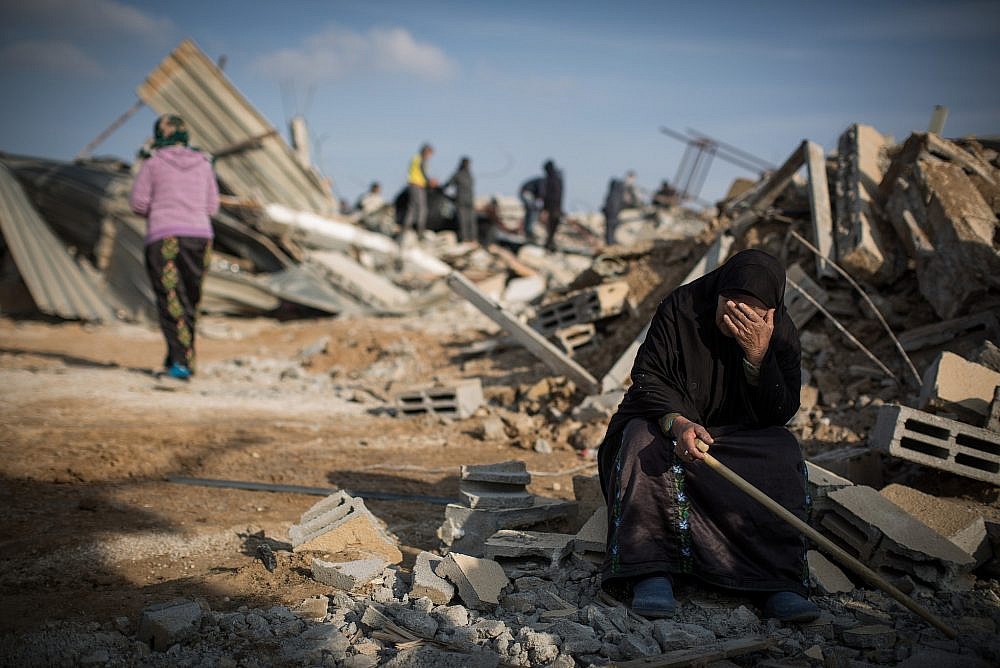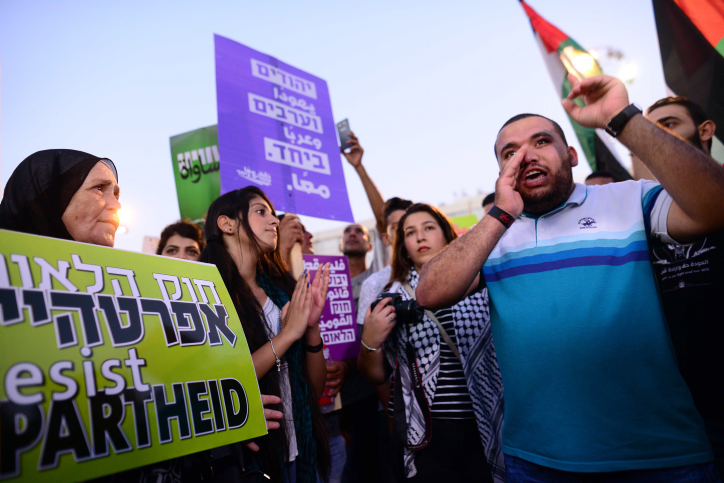Giving Palestinians citizenship doesn’t make Israel any less colonial
The idea of granting citizenship to annexed Palestinians will simply add another deceptive layer to the façade of Israeli democracy.

A Bedouin woman reacts after seeing her demolished home in the village of Umm al-Hiran in the Negev desert, in southern Israel, January 18, 2017. (Hadas Parush/Flash90)
 ByOrly NoyJune 21, 2020
ByOrly NoyJune 21, 2020 In conversations about Israel’s possible annexation of parts of the West Bank, the fate of Palestinians in the occupied territories is often viewed on a kind of spectrum.
In conversations about Israel’s possible annexation of parts of the West Bank, the fate of Palestinians in the occupied territories is often viewed on a kind of spectrum.There are those who talk about an accelerated form of ethnic cleansing, which would minimize the number of Palestinians in the areas annexed to Israel. Others describe the continuation of the status quo, in which Palestinians remain stateless and without rights. And yet others talk about granting the annexed Palestinians Israeli residency, akin to the Palestinians of East Jerusalem, who were officially annexed in 1980.
It is not for naught that the word “apartheid” has entered the Israeli lexicon since annexation became Prime Minister Netanyahu’s policy vis-à-vis the occupied territories. It is clear to all that either way, Israel is not planning on granting citizenship to the Palestinian residents whose lands it will plunder.
Obsessively agonizing over Jewish demographic supremacy has been a cornerstone of Israeli policy since the state’s founding. Surely one must assume that annexation won’t stray very far from that organizing principle.
There is a logic behind the idea that Palestinians could launch an immediate struggle for Israeli citizenship should they be annexed. This demand will likely touch on the most sensitive Zionist nerve — exposing the fraudulent concept of “Jewish and democratic” — and may yet cause the public to turn on Netanyahu’s annexation plans.
A struggle for citizenship, however, will signify a larger strategy for popular struggle, rather than a desire to become Israelis. More importantly, in the far-fetched scenario that Israel does grant citizenship to annexed Palestinians, it will not bring Israel any closer to being the thriving democracy it claims to be.

One need only look at East Jerusalem to understand why. Since Israel occupied the eastern part of the city in 1967, Palestinian residents there have for the most part refused to accept Israeli citizenship, despite the fact that citizenship is, at least ostensibly, available to them.
It is true that the past few years have seen a significant increase in the number of requests for Israeli citizenship. Yet Israel has made the process increasingly difficult, and the number of East Jerusalem Palestinians who have received citizenship remains negligible. As a collective, Palestinians in the city reject Israeli citizenship despite the difficult conditions they live under.
The Jewish Israeli public might view this strategy as a form of stubborn refusal. After all, as citizens, Palestinians could vote for the Knesset and more effectively improve their lot. But for Palestinians, this is a matter of principle: the occupation and annexation of East Jerusalem are illegitimate, and Palestinians are unwilling to grant them legitimacy by accepting citizenship from the occupier.
Conditional citizenship
Palestinians facing annexation are also looking at the status of Israel’s Palestinian citizens as a possible model of what is to come — and it isn’t especially inviting. Palestinian citizens, after all, lived for 18 years under a military government inside Israel, followed by 54 years of systematic discrimination in nearly every aspect of life.Israeli citizenship is far less ideal when looking at the various ways Israel has oppressed its Palestinian citizens for the past 70 years, whether through brutal attempts to quash their national identity through legislation such as the Jewish Nation-State Law, or through land confiscations from northern to southern Israel. Demographic warfare is the law of the land under Zionism, and it certainly does not bypass the country’s Palestinian citizens.

The disgraceful absence of building and development plans in Arab communities is no accident. This is part and parcel of a policy designed to stifle the Palestinian population’s ability to grow, expand, and prosper on its own land.
The ban on family unification and, of course, forbidding Palestinian refugees from returning to their homeland are only two examples of Israel’s demographic obsession. The so-called “unrecognized villages” in the Negev/Naqab, and the attempt to strip the Bedouin who live there of their Israeli citizenship, are a shameful testimony of the same war.
The residents of the Bedouin village of Al-Araqib, who have seen their hamlet destroyed over 200 times by the authorities, are not subjects of a military regime. They are Israeli citizens. The residents of Qalansuwa, an Arab city in central Israel, who must face off against the bulldozers who come to destroy their homes, are also Israeli citizens.
The same goes for residents of the Triangle — Palestinian towns and villages adjacent to the Green Line in central Israel — who recently learned that their prime minister considered annulling their citizenship and turning them into citizens of a future Palestinian state.
All of these examples are a reminder that for Palestinians, citizenship is always conditional.
Annexation is a vile and criminal idea that must be fought tooth and nail. But the solution will not come from granting citizenship to Palestinians annexed to Israel. Citizenship is yet another layer of deception in the façade of Israeli democracy, which Israel has successfully touted for over seven decades.
Annexation must be stopped. The occupation of 1967 must end. And colonialism and Jewish supremacy inside the 1948 territories must be dismantled in order to build a real democracy — one that has never actually existed here.

No comments:
Post a Comment
Note: only a member of this blog may post a comment.